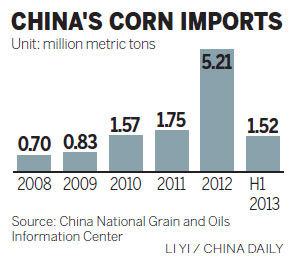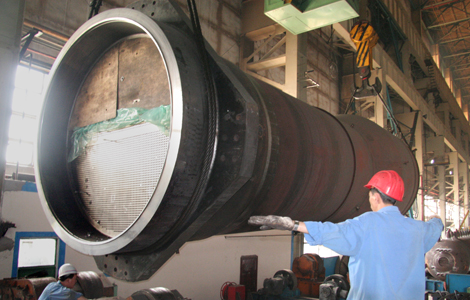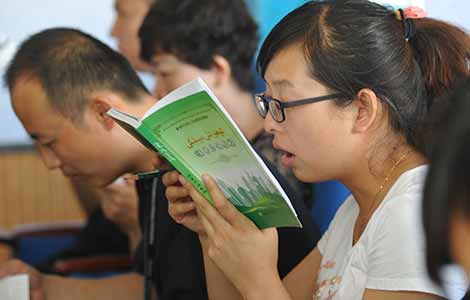Nation poised to import more GMO products
Updated: 2013-08-08 06:38
By Zhong Nan (China Daily)
|
||||||||

China's recent move to allow imports of genetically modified Argentine corn could be a sign that the country is ready to buy more GMO food products from the global market.
Argentina's Ministry of Agriculture said on Wednesday that China's General Administration of Quality Supervision, Inspection and Quarantine cleared 60,000 metric tons of GMO Argentine corn, which will be processed as chicken and hog feed.
The first shipment of Argentine GMO corn entered China on Friday. The corn was exported by Bunge Ltd's Argentina branch and imported by COFCO, China's largest grain trader, after orders from two animal feed processors in southern China.
China has bought foreign corn before, but this is the first time that the country's demand for the grain has pushed the government to import such a large shipment of GMO corn from Argentina.
Gustavo Martino, the Argentine ambassador to China, said that China's feed industry will benefit from more diversified sources of grain supply and increased competition in the market, which is now dominated by a sole supplier - the United States - which has 99 percent of the country's corn import market.
"After this, we should expect more shipments to come from Argentina next year, because import licenses have already been granted in China and it's likely that Argentine corn from the last harvest has already been sold," Martino said.
"Both Argentina and US corn are GMO corn, where the level of biotech production has reached around 90 percent of their respective domestic total for corn production," he added.
In the first half of the year, the Ministry of Agriculture has approved imports of seven types of GMO crops, including three kinds of soybeans and two types of corn and cotton. The valid period for imports of the products runs from 2013 to 2018.
"Importing GMO corn can be a useful method to prevent the inflation of corn prices, which is caused by unpredictable shortages, speculation and unfavorable weather conditions," said Yang Dongcai, a researcher at the Beijing-based institute of bio-technology at the Chinese Academy of Agricultural Sciences.
"The current level of Chinese corn production is very high on an Asian basis but, on a global basis, it's still at a level where improvements can be made," Yang said.
Yang said the government has realized this and is paying close attention to GMO crops, because it wants to boost corn production beyond the current levels.
In 2012, China imported 31 tons of GMO corn for research purposes and more than 58 million tons of soybeans, mostly genetically modified, from the global market, a practice that it has been carrying on for years, according to the Center of China Agriculture for Trade and Economy at the Ministry of Agriculture.
Boosted by the booming animal feed and bio-chemical sectors, the demand for corn has surged in the past decade. More than 70 percent of the country's annual corn production was used by these two industries.
Last year, more than 120 million tons of corn was used by the livestock industry, while biochemical product producers used 61 million tons of the grain, up 9 percent year-on-year, said the China National Grain and Oils Information Center.
Not all of the processed corn is sold domestically. China produced 190 million tons of animal feed for export last year, up 5.5 percent year-on-year. The feed was sold to a number of countries, including Mongolia, Ukraine, Australia and New Zealand.
Under such circumstances, Zhang Yuxin, a professor at the Chinese Agricultural University in Beijing, said the import of GMO corn can help the government feel more comfortable and eventually modify its policies to allow farmers to grow GMO grain crops in the future.
"China has already adopted GMO cotton technology and the effect on health and yield has been substantial. GMO crops can increase yields, especially in developing nations. China, to a certain extent, can benefit from the adoption of this technology," said Zhang.
For decades, China's agricultural sector has embraced non-GMO technologies to ensure its grain output and security, because the government considers that this can prevent adverse social and economic consequences, which GMO crops might bring, including their potential impact on biodiversity.
"China's reluctance to adopt GMO or bio-technology in corn is largely because it wants to be independent of other nations in terms of food technology and security," Zhang said.
Zhang said he believes more Asian countries with low GDP growth will choose GMO technology or will allow the import of GMO agricultural products from countries such as the US, Argentina and Brazil to secure their food supply after seeing China's move.
According to a World Health Organization released in 2012, GMO foods have passed risk assessment tests and are not likely to pose risks for human health. In addition, the general public in the countries where those foods have been approved has shows no effects on its health as a result of eating such foods.
zhongnan@chinadaily.com.cn
(China Daily USA 08/08/2013 page13)
Most Viewed
Editor's Picks

|

|

|

|

|

|
Today's Top News
China's innovation prowess looms large
US, EU concerned about stalemate in Egypt
EU to continue anti-subsidy solar probe
Nation poised to import more GMO products
Illegal Shanghai stay costs foreigner 10,000 yuan
China to be leading business travel market
Cards make paying global tuition easier
Probes not targeting foreign brands
US Weekly

|

|












